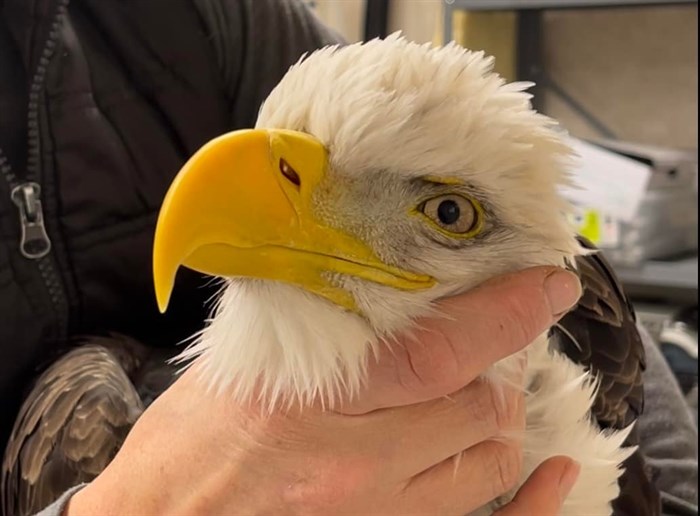
This eagle died at the B.C. Wildlife Park in Kamloops due to lead poisoning.
Image Credit: FACEBOOK/BC Wildlife Park
February 14, 2022 - 7:06 AM
A bald eagle died of lead poisoning last week after arriving at the B.C. Wildlife Park, prompting a call to hunters and anglers to stop using lead bullets, pellets and tackle.
The eagle was found in a field in the Enderby area, in mid-January and brought to the wildlife park as it was acting lethargic, said wildlife manager Tracy Reynolds.
“Mostly, it’s ingested. They’ve eaten it somehow and most of the time sources are a bullet of some kind,” she said.
READ MORE: B.C.'s Wild Animal Rehabilitation Centre has busiest year yet
Lead pellets have been banned for decades for hunting waterfowl in Canada, but pellets and bullets are still allowed for large game animals and for upland game birds like grouse. Lead bullets or pellets end up in the environment and can be consumed by fish and then make their way up the food chain, Reynolds said.
Lead bullets that are cut out of an animal and left behind with meat are also sometimes consumed by birds, she said.
“The birds eat the whole thing and get poisoned that way,” she said.
Tissue samples are going to be sent away for the poisoned eagle because its behaviour was unusual.
“He appeared to be getting stronger and better and then he basically stopped eating one day. He started to get an odour to him, so he wasn’t digesting well, and so he died the next day,” she said, adding the centre believed it was organ failure the was the cause of death but have sent tissue samples away to a lab to be further analyzed.
The wildlife park acquired a lead analyzer in 2021 to confirm lead poisoning rather than treating based on symptoms. This was the first animal they confirmed was poisoned, Reynolds said.
Rob Hope, manager of the OWL Orphaned Wildlife Rehabilitation Society, said they are currently treating three raptors with lead poisoning at its centre in the Lower Mainland.
In the last month, six raptors have died due to the sickness, an average number for this time of year. Red-tailed hawks that tested positive for lead poisoning were all from the Okanagan, he said.
READ MORE: Fundraiser to help Kelowna wildlife rehab centre find its footing
“We expect it usually anywhere between November, December, into March we usually call it the hot season around here,” Hope said, adding it coincides with hunting and fishing season.
“The birds are looking for easy food and the easiest thing is to scavenge,” he said, adding red tail hawks will sometimes consume city rats that may be poisoned.
Both wildlife rehabilitation facilities recommend that hunters and anglers use alternative sources to lead.
“If people make a choice, make a decision, it’s not only going to help them out, it’s going to help the environment,” Hope said, adding he’s also a hunter.
A deer with a fragmented lead bullet embedded within it could also poison whoever is consuming that meat, he said. It’s a safer option to avoid using lead.
To contact a reporter for this story, email Carli Berry or call 250-864-7494 or email the editor. You can also submit photos, videos or news tips to the newsroom and be entered to win a monthly prize draw.
We welcome your comments and opinions on our stories but play nice. We won't censor or delete comments unless they contain off-topic statements or links, unnecessary vulgarity, false facts, spam or obviously fake profiles. If you have any concerns about what you see in comments, email the editor in the link above.
News from © iNFOnews, 2022